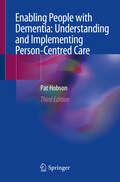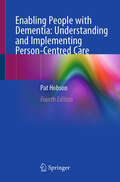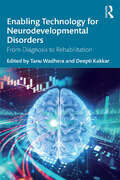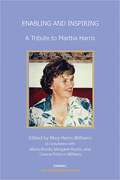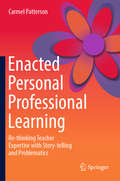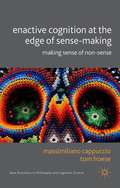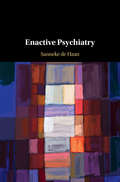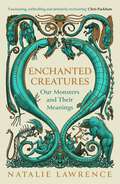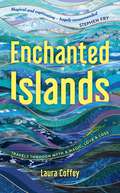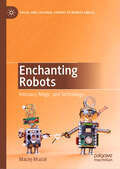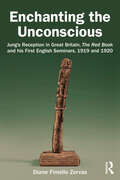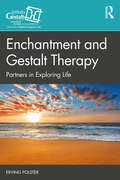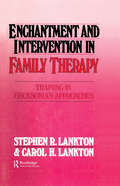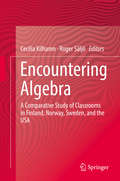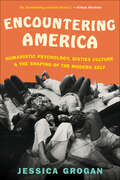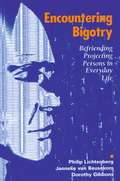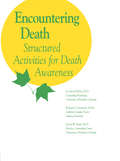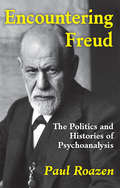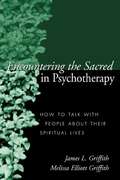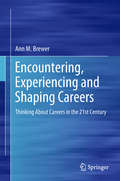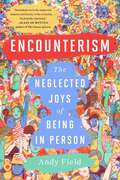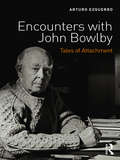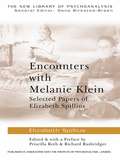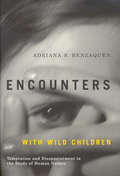- Table View
- List View
Enabling People with Dementia: Understanding And Implementing Person-centred Care
by Pat HobsonThis new updated edition challenges the perceptions, beliefs and attitudes of professionals working in dementia care settings by drawing on the theory of person-centred care. It demonstrates the importance of this theory for interacting with and caring for people with dementia. It also provides an overview of the theory in relation to two other well-known theories on dementia, and stresses the need to consider the world from the perspective of people with dementia. Moreover, the book examines the importance of dementia care environments, positive interactions, meaningful activities and the concept of personhood, which are all essential to improving the health and wellbeing of people living with dementia. In closing, it underscores the need to remember that the focus of care should be on maximizing the person’s abilities, enabling them, and promoting person-centred care. Given its content and style, the book offers a resource that can be read and understood by health and social care professionals alike, as well as anyone else caring for someone with dementia, including family members and carers.
Enabling People with Dementia: Understanding and Implementing Person-Centred Care
by Pat HobsonThis new updated edition draws on the theory of person-centred care to challenge the perceptions, beliefs, and attitudes of professionals working in dementia care settings. It shows the importance of interacting with and caring for people with dementia and stresses the need to consider the world from the perspective of people with dementia. New chapters in this edition develop on the management of end-stage dementia and end of life by underlining the importance of advanced care decisions and planning, or of psychosocial and spiritual support. New chapters will also help manage distress and changes in behaviour as well as common symptoms associated with end of life in dementia.In addition, this book studies dementia care environments, positive interactions, meaningful activities and the concept of personhood, to show their significance in improving the health and well-being of people living with dementia. Finally, this book gives a voice to the carers by sharing their experiences of dementia, and underscores the need to remember that the focus of care should be on maximizing the person’s abilities, enabling them, and promoting person-centred care.
Enabling Technology for Neurodevelopmental Disorders: From Diagnosis to Rehabilitation
by Tanu WadheraThis cutting-edge volume explores how technological tools can be designed, engineered and implemented to assess and support individuals with neurodevelopmental disorders from diagnosis through to rehabilitation. Tanu Wadhera and Deepti Kakkar and their expert contributors focus on technological tools as equalizers in Neurodevelopmental disorders (NDDs) at every stage, the importance of demand-specific design, and how we can best engineer and deploy both invasive and non-invasive individual-centered approaches that support and connect individuals. Considering the perspectives of patients, clinicians and technologists, it explores key topics including design and evaluation of platforms for tech-tools, automated diagnosis, brain imaging techniques, tech-diagnostic frameworks with AI and machine learning, sensing technology, smart brain prosthetics, gamification, alternative communication devices, and education tools and interactive toys. Outlining future challenges for research, Enabling Technology for Neurodevelopmental Disorders is useful for scholars and professionals in psychology, technology, engineering and medicine concerned with design, development and evaluation of a range of assistive technological tools.
Enabling and Inspiring: A Tribute to Martha Harris
by Gianna Williams Margaret Rustin Meg Harris Williams Maria RhodeMartha Harris (1919-1987) was one of the most influential and also one of the most loved psychoanalysts of the generation that trained with Melanie Klein. She also worked with Wilfred Bion, and wrote many books and papers on psychoanalytic training and child development. Her colleague James Gammill cites Mrs Klein as saying: She is one of the best people I have ever known for the psychoanalysis of children ... and she has a mind of her own. Harris was responsible for the child psychotherapy training at the Tavistock Clinic from 1960 onwards, developing laterally the method founded on infant observation that had been put in place by Esther Bick. She established cross-clinic work discussion groups, a pioneering schools' counselling course (in collaboration with her husband Roland Harris), and individual work with disturbed children in the school environment. Her belief that psychoanalytic ideas could and should travel, both geographically and across the professions, led to her seeding the Tavi Model in many other countries through regular teaching trips, in company with her later husband Donald Meltzer. Her influence was not as a theorist, but as a teacher with an extraordinary capacity to engage processes of introjective learning in both students and readers. This tribute by some of those who studied with her is not simply testimony to a remarkable teacher and clinician whose wisdom has been rarely equalled; it also offers inspiration to others who may be struggling to find ways of using psychoanalytic ideas imaginatively in a variety of contexts - clinical, social or scholarly - in what can at times appear to be an unreceptive world.
Enacted Personal Professional Learning: Re-thinking Teacher Expertise with Story-telling and Problematics
by Carmel PattersonThis book offers a vital new approach to teacher professional learning, drawing on teachers’ stories from the field. It investigates expert teachers’ professional learning and uses a narrative framework to analyse their meaning-making processes. The book focuses on how proficient teachers develop their expertise, emphasising that individual needs and the contextual nature of learning require a personally enacted approach. Further, it explores the stories of five secondary school teachers, nominated by their colleagues for their outstanding expertise, to present new insights into expert teachers’ views. Using a new evidence-based approach, Enacted Personal Professional Learning, it incorporates teachers’ unique perspectives, problems and thought processes in order to understand expert teachers’ learning, and offers essential principles for promoting storytelling to help teachers be or become empowered educators who can actively shape education communities for teacher professional learning.
Enactive Cognition At The Edge Of Sense-making
by Massimiliano Cappuccio Tom FroeseThe enactive approach replaces the classical computer metaphor of mind with emphasis on embodiment and social interaction as the sources of our goals and concerns. Researchers from a range of disciplines unite to address the challenge of how to account for the more uniquely human aspects of cognition, including the abstract and the nonsensical.
Enactive Psychiatry
by Sanneke de HaanPsychiatry is enormously complex. One of its main difficulties is to articulate the relationship between the wide assortment of factors that may cause or contribute to psychiatric disorders. Such factors range from traumatic experiences to dysfunctional neurotransmitters, existential worries, economic deprivation, social exclusion and genetic bad luck. The relevant factors and how they interact can differ not only between diagnoses but also between individuals with the same diagnosis. How should we understand and navigate such complexity? Enactive Psychiatry presents an integrative account of the many phenomena at play in the development and persistence of psychiatric disorders by drawing on insights from enactivism, a theory of embodied cognition. From the enactive perspective on the mind and its relation to both the body and the world, we can achieve a new understanding of the nature of psychiatric disorders and the causality involved in their development and treatment, thereby resolving psychiatry's integration problem.
Enchanted Creatures: Our Monsters and Their Meanings
by Natalie LawrenceThe hydra rears its many heads in a flurry of teeth and poisonous fumes. The cyborg lays waste to humanity with a ruthless, expressionless stare.From ancient mythology to modern science fiction, we have had to confront the monsters that lurk in the depths of our collective imagination. They embody our anxieties and our irrational terrors, giving form to what we don't wish to know or understand. For millennia, monsters have helped us to manage the extraordinary complexity of our minds and to deal with the challenges of being human.In Enchanted Creatures, Natalie Lawrence delves into 15,000 years of imaginary beasts and uncovers the other-worldly natural history that has evolved with our deepest fears and fascinations. Join Lawrence on a tour of prehistoric cave monsters, serpentine hybrids, deep-sea leviathans and fire-breathing Kaiju. Discover how this monstrous menagerie has shaped our minds, our societies and how we see our place in nature.
Enchanted Islands: A Mediterranean Odyssey – A Memoir of Travels through Love, Grief and Mythology
by Laura CoffeyEnchanted Islands tells the true story of Laura Coffey's epic journey around the mystical archipelagos of the Mediterranean. Blending memoir, travel and nature writing with tales from The Odyssey, and infused with sharply comic wit, this is a celebration of the redemptive powers of cold-water swimming and luminous star-lit skies.
Enchanting Robots: Intimacy, Magic, and Technology (Social and Cultural Studies of Robots and AI)
by Maciej MusiałThis book argues that robots are enchanting humans (as potential intimate partners), because humans are enchanting robots (by performing magical thinking), and that these processes are a part of a significant re-enchantment of the “modern” world. As a foundation, the author examines arguments for and against intimate relationships with robots, particularly sex robots and care robots. Moreover, the book provides a consideration of human-robot interactions and philosophical reflections about robots through the lens of magic and magical thinking as well as theoretical and practical re-evaluations of their status and presence. Furthermore, the author discusses the abovementioned issues in the context of disenchantment and re-enchantment of the world, characterizing modernity as a coexistence of these two processes. The book closes with a consideration of future scenarios regarding the meaning of life in the age of rampant automation and the possibility that designing robots becomes a sort of new eugenics as a consequence of recognizing robots as persons.
Enchanting the Unconscious: Jung’s Reception in Great Britain, The Red Book and his First English Seminars, 1919 and 1920
by Diane Finiello ZervasThis original volume explores Jung’s earliest English seminars, held in 1919 and 1920, in relation to the impact of Liber Novus and The Red Book and his new exoteric and esoteric concepts of analytical psychology created during the Great War.The groundbreaking seminars presented in the book yield important insights about Jung’s application of analytical methods and the psychological concepts he developed in response to his confrontation with the unconscious, recorded in Liber Novus and in his Collected Papers on Analytical Psychology, edited by Dr. Constance Long, one of his first English analysands and colleagues. The English seminars illuminate the extent to which Jung shared, or alluded to, material from Liber Novus and The Red Book, supported by evidence from Long’s journal which contains a wealth of additional material about Jung’s method of supervision, views on transference, her own analysis and the eventual break-up of the London group.Enchanting the Unconscious is an important and timeless contribution to Jungian history and our understanding of early formulations of Jung’s conceptual model of the psyche, making it of great interest to Jungian analysts, analytical psychologists, students of Jungian history and general readers interested in exploring Jung’s earliest teaching seminars previously undocumented or distorted by hearsay.
Enchantment and Gestalt Therapy: Partners in Exploring Life (The Gestalt Therapy Book Series)
by Erving PolsterEnchantment and Gestalt Therapy is a personal exploration of Erving Polster’s remarkable career, the value of the Gestalt approach, and the power of enchantment in psychotherapy. Polster points ahead to a vision of a psychotherapy that includes the population as a whole rather than focusing on individuals, highlights common aspects of living, and focuses on creating an ethos for a shared understanding. The book outlines the six Gestalt therapy concepts that have formed the basis of Polster’s work and describes Life Focus Groups, with an emphasis on the communal relationship between tellers and listeners. Polster also describes the phenomenon of enchantment in psychotherapy in detail, with reference to his own experiences. This unique work is essential reading for Gestalt therapists, other professionals interested in Gestalt approaches, and readers looking for a deeper insight into community and connection.
Enchantment and Intervention in Family Therapy: Training in Ericksonian Approaches
by Stephen R. Lankton Carol H. LanktonFirst published in 1986. Motivation is different for different cultures, apparent even in the recent contrast between our experience of the relatively stable residential neighborhood and the shifting sands of the beach community. The bait is different for each different fisher. Each group has a goal determined by collective needs. The needs of individual members of each group are defined by an interplay of biology, personal history, culture, family, values, peers, expected sanctions, chronological age, psychological age, and environmental circumstances. This book is a composite assemblage of teachings from five different workshops in the U.S. Primarily, it has been created from what the author’s feel are the most representative of several family therapy workshops they have conducted, some individually and some together. These took place in Boston, Massachusetts; Austin, Texas; Newport, Rhode Island; Phoenix, Arizona; and Pensacola Beach, Florida.
Encontrar o amor (desta vez de verdade): o que sabem as mulheres que triunfam com os homens
by Marta HariQuando queremos ter uma relação de casal, o entendimento entre homens e mulheres parece simplesmente impossível. Não é de se estranhar, já que falamos idiomas muito diferentes. “Encontrar o amor (desta vez de verdade)” aborda esse problema com uma linguagem clara e descontraída, que fará você se sentir como se estivesse falando com uma amiga. No entanto, como ocorreria com sua melhor amiga, Marta Hari vai dizer as coisas na sua cara, com transparência. O livro também aborda os erros mais comuns de nós mulheres na hora de nos relacionarmos com um homem que nos atrai. O amor, segundo Marta Hari, começa com o jogo da atração. Um jogo, que como todos, têm suas regras e você tem que aprendê-las se quer ganhar. É um jogo de estratégia, no qual você tem que começar sabendo que é a rainha, uma peça chave, com movimentos chaves. “Encontrar o amor (desta vez de verdade)” não é um livro para qualquer mulher. Apela para mulheres valentes, que já chegaram ao seu limite de fracassos no amor e estão dispostas a tomar as rédeas da sua vida.
Encountering Algebra: A Comparative Study of Classrooms in Finland, Norway, Sweden, and the USA
by Cecilia Kilhamn Roger SäljöThe book reports a comparative research project about algebra teaching and learning in four countries. Algebra is a central topic of learning across the world, and it is well-known that it represents a hurdle for many students. The book presents analyses built on extensive video-recordings of classrooms documenting the first introduction to symbolic algebra (students aged 12 to 14). While the content addressed in all classrooms is variables, expressions and equations, the teaching approaches are diverse. The chapters bring the reader into different algebra classrooms, discussing issues such as mathematization and social norms, the role of mediating tools and designed examples, and teacher beliefs. By comparing classrooms, new insights are generated about how students understand the algebraic content, how teachers instruct, and how both parties deal with difficulties in learning elementary algebra. The book also describes a research methodology using video in search of taken-for-granted aspects of algebra lessons.
Encountering America: Humanistic Psychology, Sixties Culture & the Shaping of the Modern Self
by Jessica GroganA dramatic narrative history of the psychological movement that reshaped American cultureThe expectation that our careers and personal lives should be expressions of our authentic selves, the belief that our relationships should be defined by openness and understanding, the idea that therapy can help us reach our fullest potential—these ideas have become so familiar that it's impossible to imagine our world without them.In Encountering America, cultural historian Jessica Grogan reveals how these ideas stormed the barricades of our culture through the humanistic psychology movement—the work of a handful of maverick psychologists who revolutionized American culture in the 1960s and '70s. Profiling thought leaders including Abraham Maslow, Rollo May, and Timothy Leary, Grogan draws on untapped primary sources to explore how these minds and the changing cultural atmosphere combined to create a widely influential movement. From the group of ideas that became known as New Age to perennial American anxieties about wellness, identity, and purpose, Grogan traces how humanistic psychology continues to define the way we understand ourselves.
Encountering Bigotry: Befriending Projecting People in Everyday Life
by Philip Lichtenberg Janneke Beusekom Dorothy GibbonsEncountering Bigotry examines the occurrence of emotionally fraught and socially provocative expressions, such as racism, sexism, homophobia, anti-Semitism, classism, and other forms of hatred of outgroups or others, in everyday experience. The editors categorize such remarks as projections, particular forms of perceiving oneself and others in the world. This projection allows the person to perceive emotional intensity without owning (i.e., without attributing to the self) the feeling or experiencing anxiety-producing emotions. Such projections are not pathological, they observe, but rather "faulty" and not beyond repair. Utilizing experiences gathered from various people and settings, and deriving theory from common psychoanalytic and Gestalt therapy, the observations and conclusions found in Encountering Bigotry are as applicable in any social context as they are in the therapeutic relationship.
Encountering Death
by Ira David Welch Richard F. Zawistoski David W. SmartFirst published in 1991. The intent of this book is not to replace standard textbooks on death and dying. It is meant to be used as a supplement to the texts which provide the academic information necessary to any real understanding and examination of societal assumptions and attitudes toward death and dying. This book presents a number of stimulating and provocative activities that will help class members confront death and dying in a more personal and lasting manner. This book provides the information necessary to any real understanding and examination of societal assumptions and attitudes toward death and dying. These stimulating and provocative activities will help class members confront death and dying in a more personal and lasting manner.
Encountering Freud: The Politics and Histories of Psychoanalysis
by Paul RoazenIn this volume Paul Roazen examines different national responses to Freud and the beginnings of psychoanalysis. He examines Freud's work in the contexts of law, society, and class, as well as other forms of psychology.Encountering Freud includes a brilliant essay on Freud and the question of psychoanalysis' contribution to radical thought, in contrast to the conservative tradition. Roazen takes up the extravagant claims of Marcuse and Reich, and sees the risks of then overglamorization of the beginnings of psychoanalysis as a profession. Roazen views the legacies of Harry Stack Sullivan, Helene Deutsch, and Erik H. Erikson as less rich because their work conformed to the social status quo. He sees Freud's inability to avoid an ambiguous outcome as a lack of concern with normality and a refusal to own up to the wide variety of psychological solutions he found both therapeutically tolerable and humanly desirable.Roazen concludes with a series of explorations on the dichotomies Freud left behind: clinical discoveries versus philosophical standpoints; the relationship of normality to nihilism; and a defense of a therapeutic setting based on trained specialists versus a therapeutic approach encouraging self-expression. This is a volume that utilizes a sharp focus on Freud and his followers and dissenters to explore the question of political psychology at one end and psych-history at the other end of analysis.
Encountering the Sacred in Psychotherapy
by Melissa Elliott Griffith James L. GriffithDrawing on narrative, postmodern, and other therapeutic perspectives, this book guides therapists in exploring the creative and healing possibilities in clients' spiritual and religious experience. Vivid personal accounts and dialogues bring to life the ways spirituality may influence the stories told in therapy, the language and metaphors used, and the meanings brought to key relationships and events. Applications are discussed for a wide variety of clinical situations, including helping people resolve relationship problems, manage psychiatric symptoms, and cope with medical illnesses.
Encountering, Experiencing and Shaping Careers: Thinking About Careers in the 21st Century
by Ann M. BrewerThis book investigates how people encounter, experience and shape their careers. Both the concept and the reality of a career is changing as organisations respond to globalisation and market forces. This impact is reflected in the internal labour market and hence career journeys of individuals. How people think about their career and career choices is more diverse than ever before due not only to environmental transformations but also to variations in the workforce, consisting now of five generations. With each new generation, there is little argument that contemplating career choices, seeking and promoting work opportunities as well as hiring relationships are now markedly different and less certain than previously. People have now and increasingly a greater choice over when, where, how to work and for how long. This book will provide learning for those people early in their careers as well as those in mid to later career, looking to develop or enrich their careers in some way. Understanding how work functions in people’s lives; the personal and family costs incurred in maintaining and exiting a career, and how and why remaining or leaving a career is successful or not, is highly relevant. The need for career support, derived from personal, professional and organisational connections plays an important role in career choice, career transition, and career opportunities. Creativity and other 21st century skills, the vital dimensions of career development, is also discussed in this book.
Encounterism: The Neglected Joys of Being In Person
by Andy FieldA playful, analytical, informed, and poetic exploration of the delight and transformative power of real-life encounters. The light touch of a hairdresser’s hands on one’s scalp, the euphoric energy of a nightclub, huddling with strangers under a shelter in the rain, a spontaneous snowball fight in the street, a daily interaction with a homeless man—such mundane connections, when we closely inhabit the same space, and touch or are touched by others, were nearly lost to “social distancing.” Will we ever again shake hands without a thought? In this deeply rewarding book, Andy Field brings together history, science, psychology, queer theory, and pop culture with his love of urban life and his own experiences—both as a city-dweller and as a performance artist—to forge creative connections: walking hand-in-hand with strangers, knocking on doors, staging encounters in parked cars. In considering twelve different kinds of encounters, from car rides to video calls to dog-walker chats in the park, Field argues “that in the spontaneity and joy of our meetings with each other, we might find the faint outline of a better future.”
Encounters with John Bowlby: Tales of Attachment
by Arturo EzquerroEncounters with John Bowlby: Tales of Attachment is an insightful, heartfelt and faithful homage to John Bowlby (1907-1990), the ‘father’ of attachment theory. The book unfolds as a touching and absorbing biographical journey into his life and work, where Bowlby is portrayed vividly through his individual, family and group attachment history, as well as his personal and professional development. This is a thoroughly researched and unique volume: a creative hybrid of scholarly erudition and passionately-delivered real life experiences covering the entire field of attachment. The work is co-constructed from the privileged position of sitting at the feet of the founder of the theory, drawing on his lifelong research and knowledge. The reader can learn from and identify with stirring, true stories that illustrate the struggle to become attached, to survive, and to grow. Encounters with John Bowlby will appeal to anyone who is interested in personal development and relationships. It will be of special interest to mental health professionals, psychotherapists, psychologists, psychiatrists, psychiatric nurses, social workers, psychoanalysts and group analysts, as well as other healthcare professionals, such as general practitioners and paediatricians. The text will also be useful to students undertaking doctoral courses or attending other courses related to attachment and John Bowlby.
Encounters with Melanie Klein: Selected Papers of Elizabeth Spillius (The New Library of Psychoanalysis)
by Elizabeth SpilliusIn Encounters with Melanie Klein: Selected Papers of Elizabeth Spillius the author argues that her two professions, anthropology and psychoanalysis, have much in common, and explains how her background in anthropology led her on to a profound involvement in psychoanalysis and her establishment as a leading figure amongst Kleinian analysts. Spillius describes what she regards as the important features of Kleinian thought and discusses the research she has carried out in Melanie Klein's unpublished archive, including Klein's views on projective identification. Spillius's own clinical ideas make up the last part of the book with papers on envy, phantasy, technique, the negative therapeutic reaction and otherness. Her writing has a clarity which is very particular to her; she conveys complicated ideas in a most straightforward manner, well illustrated with pertinent clinical material. This book represents fifty years of the developing thought and scholarship of a talented and dedicated psychoanalyst.
Encounters with Wild Children
by Adriana S. BenzaquénThrough detailed readings of a wide variety of accounts, debates, and representations, Encounters with Wild Children explores the many different meanings these children were given and the varied responses they elicited. Adriana Benzaquén explains why wild children continue to haunt and fascinate Western scientists and shows how the knowledge they have generated in different disciplines, including anthropology, psychology, psychiatry, pedagogy, linguistics, and sociology, has contributed to the shaping and reshaping of the modern understanding of "the child" and affected the social and institutional practices directed at all children in schools, welfare, mental health, and the law.
